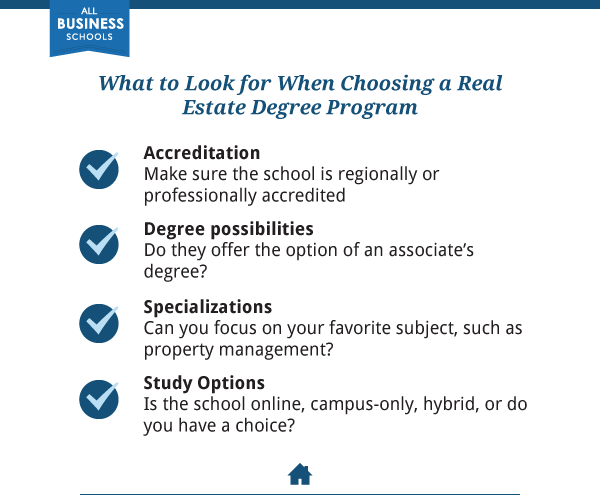Real Estate Career and Degree Guide
Real Estate Degrees: What Can You Do Once You Earn Your Degree?

Real estate is a competitive and fascinating industry that encompasses professionals in many sub-sectors, including residential and commercial real estate agents, brokers, mortgage brokers, property managers and independent investors.
Many of these careers are held by independent business people with a strong entrepreneurial spirit and desire to build a career and life on their own terms.
However, they also recognize that in order to succeed, they need the very best training and education to serve as a foundation on which to build their dreams. This is where real estate degrees come in.
Why Pursue a Degree in Real Estate?
A real estate license will provide a certain level of education and preparedness, but increasingly the professionals who truly succeed have full academic real estate degrees. There are degrees available at the associate's, bachelor's and master's levels that focus specifically on real estate subjects.
Their courses go into depth and detail about how real estate markets work and provide you with the sort of knowledge you need to position your business for maximum success. When you focus your efforts specifically on real estate for the duration of a degree program, you will enter the job market with a level of preparedness that was formerly only found among seasoned professionals.
Should I Get a Real Estate Degree?
When approaching whether to pursue formal education, you can investigate a more traditional route and work towards a general degree in business or economics. Such a degree will serve you well, but you will likely have to fight extra hard to break into the industries you truly wish to work in. You can work in internships and perhaps take a few courses to help focus your resume in a specific direction.
Rather, if you already know that you want to pursue real estate as a career, it makes more sense to dive into the specialized area so that you will be ready for work as soon as you graduate. Further, if you are already working in the field, you can broaden the scope of your knowledge, and your ability to analyze market trends by pursuing a specialized course of study. You will likely encounter many of the same sorts of analytical problems that other business students work on, but you will tackle them in the context of real estate.
Online Real Estate Degrees
If you are eager to get started in real estate, you may be able to land a job in the field without a degree. But to go farther in the field and build the lasting career you want, you will need more education. These days, a solitary high school diploma is not held in very high esteem. However, if you are already working it may not be feasible to take traditional courses on a campus. Therefore, an online real estate degree is likely your best option.

Since real estate is a field that is partly managed inside an office on a computer and partly out in the field assessing various plots of land and the improvements on them, an online education makes perfectly logical sense. Most real estate professionals are self-starters who don't value being chained to a desk. So, while you are pursuing an online education you can still interact in the real world. For instance, you won't have to reschedule a client meeting around a class because you will be able to finish your school work prior to your appointment. In online education, your classwork is done on your schedule.
Things To Keep In Mind for Remote Learning
Still, it's important to note that not all online programs are as flexible as others. Some will require you to log in at specific times to participate in or moderate chat room discussions or stream a live lecture. However, other online schools organize themselves according to an asynchronous model. That means that you will be able to log in at any time of the day or night to review all of the class materials. These programs will also have a bit more leeway when it comes to submitting assignments. An asynchronous class is likely to ask that work be submitted by midnight on the day it's due, rather than at the beginning of class—as would be the norm in a traditional campus program.
Most important, make sure that your online program is fully accredited by either a regional or professional agency. In case you ever decide to pursue a higher degree or wish to transfer credit to a different school, you will need all of your work to be validated by the original institutions you attended. Discuss this issue with your admissions counselor to ensure that you are on the right track. You might also compare the accreditation of an online program against that of your state's major universities.
Choosing a Real Estate Degree Program
When you decide that you want to improve yourself through education, you'll want to be certain that you are entering the best school possible. In the past, researching colleges was a tedious and time-consuming process that involved ordering packets from individual schools, then sorting through all of the material and applications. Nowadays all you need to do is search the Internet for real estate schools.

Accreditation is one of the most important elements of school selection. You need the assurance that your work will be recognized when you decide to apply for higher degrees, or if you decide to transfer to a different program. Research the accrediting agencies that have certified your school.
Here are the regional accrediting agencies:
- North Central Association of Colleges and Schools
- New England Association of Schools and Colleges
- Southern Association of Colleges and Schools
Real Estate Degree Options
Associate Degree

An associate degree can be a terrific way to get started in real estate. The degree generally takes two years and it will give you a firm foundation on which to launch a career. If your college also offers a four-year bachelor's degree, you can always return to complete the remaining two years, if you like. What makes the associate's degree attractive is that it allows you to add an educational credential to your resume even while you continue to study.
Bachelor's Degree in Real Estate
Real estate agents and brokers must have at least a high school diploma, but more companies are choosing to hire college graduates as the financial transactions and responsibilities surrounding real estate sales become increasingly complex. If you want to advance into other areas such as commercial real estate, a bachelor's degree becomes even more important. Colleges and universities offer several business options for potential real estate professionals, including the following:
In addition to the core finance and economics classes you'll take with these degree programs, you should seek out courses that cover real estate law topics, land-use planning, ethics and environmental issues. Marketing and finance courses are especially important if you are interested in managing or owning a real estate company.

A bachelor's degree will also include a lot of core education courses that include English and other humanities and science courses. These courses are also vital to your education, as they offer the opportunity to expand your communication skills with new knowledge and insight. For instance, a geology course might inform how you assess land and an English course will help you write clear and concise proposals or marketing materials.
Appraisers and assessors are not necessarily required to hold a degree in order to practice. However, licensed assessors and appraisers are required to have their bachelor's degree or equivalent in credit hours. Check with your state and local government to find out what is required of these professionals.
Master of Business Administration (MBA)
It may seem that an MBA is a rather general degree that prepares you to be a business generalist. However, you can focus your studies on real estate through the right program. Look for programs that offer this and other specializations so that you can be sure to focus on the area that most appeals to you. Here are some courses you might find that specialize specifically on real estate:
- Real Estate Development
- Urban Systems
- Real Estate Capital Markets
Other general MBA courses you might take to broaden your scope of knowledge include:
- Sales and Trading
- Hedge Funds
- Sovereign Wealth Funds
Master's Degree in Real Estate Development (MRED)
To succeed as a real estate developer, you will need to go all the way and matriculate with a Master's in Real Estate Development (MRED) or a Master of Science in Real Estate Development (MSRED). Since real estate development requires intricate calculations regarding financing, construction costs and long-term projections for profitability, you will need the training that only a master's degree can offer.
Some courses you might take towards a MRED include:
- Real Estate Market Analysis
- Design of the Built Environment
- Advanced Financial Analysis for Commercial Real Estate
- Real Estate Law for Developers
Make a Move in the Right Direction
Now that you know you won't have to upend your life in order to return to school and pursue your real estate career, why not get started researching accredited schools and programs that can get you moving in the right direction?
